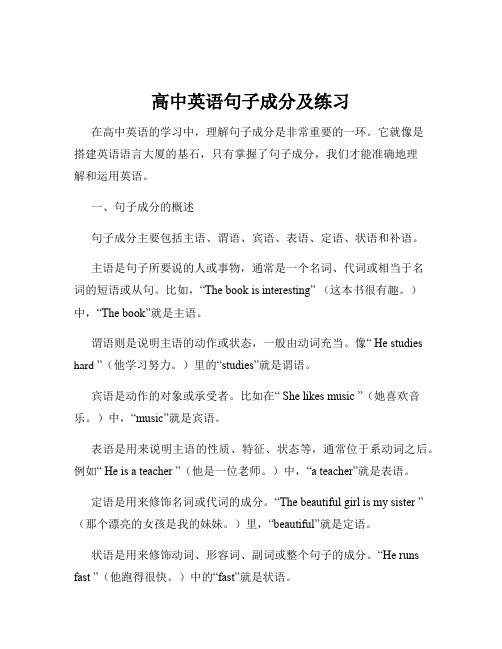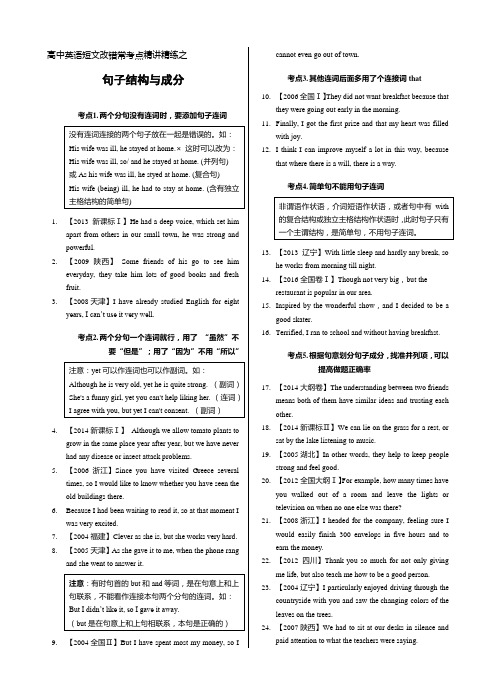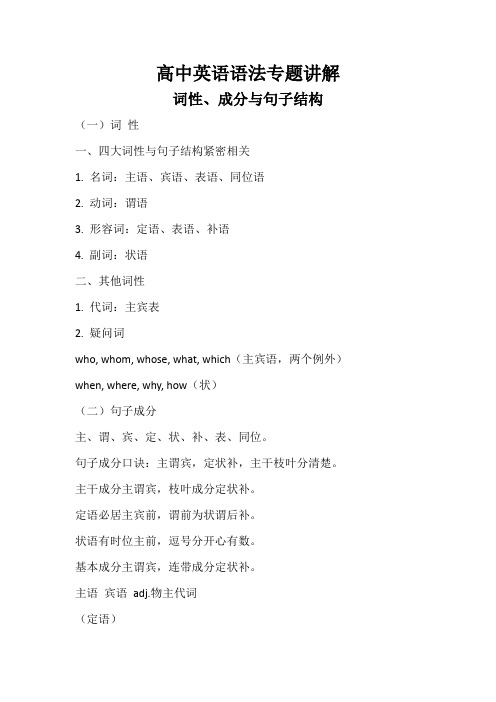高中英语句子成分和结构讲与练(精版)
- 格式:pdf
- 大小:178.05 KB
- 文档页数:6

句子句子从目的上分:1.陈述句2疑问句1)一般疑问句2)选择疑问句3)反意疑问句4)特殊疑问句5)双重疑问句3.祈使句4.感叹句句子从结构上分:1.简单句2.并列句(并列复合句)3.复合句(主从复合句)1)名词性从句:(1)主从 (2) 宾从 (3)表从 (4)同从2)形容词性从句定从(限定性的定语从句和非限定性的定语从句)3) 副词性从句(状从)简单句的五种基本句型subject): 是执行句子的行为或动作的主体。
The sun rises in theeast.(名词)He likesdancing.(代词)Twenty years is ashort time in history.(数词)Seeing isbelieving.(动名词)To see is tobelieve.(不定式)What he needs is a book.(主语从句)It is very clear thatthe elephant is roundand tall like atree.(It形式主语,主语从句是真正主语)predicate): 说明主语的动作、状态和特征。
We studyEnglish.He likes playing the games.predicative): 系动词之后的成分,表示主语的性质、状态和特征。
He is ateacher. (名词)Five and five is ten. (数词)He isasleep. (形容词)His father isin. (副词)The picture is on the wall. ( 介词短语)My watch is gone /missing /lost.(形容词化的分词)To wear a flower is tosay “I’m poor, Ican’t buy a ring. (不定式)The question iswhether they willcome.(表语从句)(感觉) ...It sounds a goodidea.Thesound sounds strange.Her voice soundssweet.Tom looksthin.The food smellsdelicious.The foodtastes good.The door remainsopen.Now I feeltired.1)动作的承受者-----动宾I like China. (名词) He hatesyou. (代词)How many do you need? We need two. (数词)We should help the old and the poor.I enjoy working with you. (动名词)I hope to see you again. (不定式)Did you write down what he said? (宾语从句)2)介词后的名词、代词和动名词-----介宾Are you afraid of the snake?Under the snow, there are many rocks.3-----间宾(指人)和直宾(指物)He gave me a bookyesterday.Give the poor mansome money.全称为宾语补足语。

高中英语句子成分及练习在高中英语的学习中,理解句子成分是非常重要的一环。
它就像是搭建英语语言大厦的基石,只有掌握了句子成分,我们才能准确地理解和运用英语。
一、句子成分的概述句子成分主要包括主语、谓语、宾语、表语、定语、状语和补语。
主语是句子所要说的人或事物,通常是一个名词、代词或相当于名词的短语或从句。
比如,“The book is interesting” (这本书很有趣。
)中,“The book”就是主语。
谓语则是说明主语的动作或状态,一般由动词充当。
像“ He studies hard ”(他学习努力。
)里的“studies”就是谓语。
宾语是动作的对象或承受者。
比如在“ She likes music ”(她喜欢音乐。
)中,“music”就是宾语。
表语是用来说明主语的性质、特征、状态等,通常位于系动词之后。
例如“ He is a teacher ”(他是一位老师。
)中,“a teacher”就是表语。
定语是用来修饰名词或代词的成分。
“The beautiful girl is my sister ”(那个漂亮的女孩是我的妹妹。
)里,“beautiful”就是定语。
状语是用来修饰动词、形容词、副词或整个句子的成分。
“He runs fast ”(他跑得很快。
)中的“fast”就是状语。
补语是用来补充说明宾语或主语的情况。
“We make him happy ”(我们使他高兴。
)中的“happy”就是补语。
二、主语主语可以由名词、代词、数词、动名词、不定式、名词化的形容词、短语或从句等来充当。
名词作主语:“Books are our friends ”(书是我们的朋友。
)代词作主语:“They are playing football ”(他们正在踢足球。
)数词作主语:“Two is not enough ”(两个是不够的。
)动名词作主语:“Swimming is good for health ”(游泳对健康有益。

简单句的五种基本结构正确的英语句子都要符合一定的语法结构要求。
英语句子的结构可以归纳成五种基本句型。
英语句子都可以看作是这五种句型及其扩大、组合、省略或倒装构成的。
掌握这五种基本句型,是掌握各种英语句子结构的基础,也是学好其他语法知识的前提。
英语五种基本句型结构如下:用符号表示为:①SV(主+谓)②SVO(主+谓+宾)③SVoO(主+谓+间宾+直宾)④SVOC(主+谓+宾+宾补)⑤SVP(主+系+表)主语(subject)谓语(predicate)宾语(object)定语(attribute)状语 (adverbial) 补语(complement)表语(predicative)考点1. 基本句型一:SV(主+谓)这类句子的谓语动词都是不及物动词,都不带宾语,但可以带状语。
如:It is raining now. (SV)We’ve worked for 5 hours. (SV) The meeting lasted half an hour. (SV)Time flies. (SV)练习1. 分析下列句子成分,并在后面括号内标明属于五种基本句型中的哪一种。
1.Dark clo uds hung overhead.( )2.Gradually a smile appeared on herface. ( )3.He is smiling all over his face.( )4.I did well in English. ( )5.He talked loudly in the classroomyesterday. ( )考点2. 基本句型三:SVO(主+谓+宾)此结构是由“主语+及物动词(词组)+宾语”构成。
She likes English.We planted a lot of trees on the farm yesterday.练习2. 分析下列句子成分,并在后面括号内标明属于五种基本句型中的哪一种。

高中英语短文改错常考点精讲精练之句子结构与成分考点1.两个分句没有连词时,要添加句子连词没有连词连接的两个句子放在一起是错误的。
如:His wife was ill, he stayed at home.×这时可以改为:His wife was ill, so/ and he stayed at home. (并列句)或As his wife was ill, he styed at home. (复合句)His wife (being) ill, he had to stay at home. (含有独立主格结构的简单句)1.【2013 新课标Ⅰ】He had a deep voice, which set himapart from others in our small town, he was strong andpowerful.2.【2009陕西】Some friends of his go to see himeveryday, they take him lots of good books and freshfruit.3.【2008天津】I have already studied English for eightyears, I can’t use it very well.考点2.两个分句一个连词就行,用了“虽然”不要“但是”;用了“因为”不用“所以”注意:yet可以作连词也可以作副词。
如:Although he is very old, yet he is quite strong. (副词)She's a funny girl, yet you can't help liking her. (连词)I agree with you, but yet I can't consent. (副词)4.【2014新课标Ⅰ】Although we allow tomato plants togrow in the same place year after year, but we have neverhad any disease or insect attack problems.5.【2006浙江】Since you have visited Greece severaltimes, so I would like to know whether you have seen theold buildings there.6.Because I had been waiting to read it, so at that moment Iwas very excited.7.【2004福建】Clever as she is, but she works very hard.8.【2005天津】As she gave it to me, when the phone rangand she went to answer it.注意:有时句首的but和and等词,是在句意上和上句联系,不能看作连接本句两个分句的连词。

句子成分 (Members of a Sentence)什么叫句子成分呢?句子的组成成分叫句子成分。
在句子中,词与词之间有必然的组合关系,依照不同样的关系,能够把句子分为不同样的组成成分。
句子成分由词或词组充当。
现代汉语里一般的句子成分有六种,即主语、谓语、宾语、定语、状语和补语。
英语的根本成分有七种:主语〔 subject〕、谓语〔 predicate〕、表语〔 predicative〕、宾语〔 object〕、定语〔 attribute〕、状语 (adverbial) 和补语(complement〕。
英语句子的根本结构能够归纳成五种根本句型及其扩大、组合、省略或倒装。
掌握这五种根本句型,是掌握各种英语句子结构的基础。
英语五种根本句型列式以下:一:SV〔主+谓〕二:SVP〔主+系+表〕三:SVO〔主+谓+宾〕四:SVoO〔主+谓+间宾+直宾〕五:SVOC〔主+谓+宾+宾补〕根本句型一:SV〔主+谓〕主语:能够作主语的成分有名词〔如 boy〕,主格代词〔如 you〕,动词不定式,动名词等。
主语一般在句首。
注意名词单数形式常和冠词不分家!谓语:谓语由动词组成,是英语时态、语态变化的主角,一般在主语此后。
不及物动词〔 vi. 〕没有宾语,形成主谓结构,如:We come.此句型的句子有一个共同特点,即句子的谓语动词都能表达完满的意思。
这类动词叫做不及物动词,后边能够跟副词、介词短语、状语从句等。
S│ V〔不及物动词〕1.The sun │ was shining.太阳在照耀着。
2.The moon │rose.月亮升起了。
3.The universe │remains.宇宙长存。
4.We all │breathe, eat, and drink. 我们大家都呼吸、吃和喝。
5.Who │cares?管它呢?6.What he said │does not matter.他所讲的没有什么关系。
7.They │talked for half an hour.他们谈了半个小时。

高中英语语法专题讲解词性、成分与句子结构(一)词性一、四大词性与句子结构紧密相关1. 名词:主语、宾语、表语、同位语2. 动词:谓语3. 形容词:定语、表语、补语4. 副词:状语二、其他词性1. 代词:主宾表2. 疑问词who, whom, whose, what, which(主宾语,两个例外)when, where, why, how(状)(二)句子成分主、谓、宾、定、状、补、表、同位。
句子成分口诀:主谓宾,定状补,主干枝叶分清楚。
主干成分主谓宾,枝叶成分定状补。
定语必居主宾前,谓前为状谓后补。
状语有时位主前,逗号分开心有数。
基本成分主谓宾,连带成分定状补。
主语宾语adj.物主代词(定语)n.物主代词(主宾表)反身代词(宾表)我I me my mine myself我们we us our ours ourselves你you you your yours yourself你们you you your yours yourselves他he him his his himself她she her her hers herself它it it its its itself他们they them their theirs themselvesNo news is good news. 没消息就是好消息。
一、主语:句子开头的、动词/助动词或be 之前的那个成分。
充当主语的有:名词、代词、名词短语、动词不定式、动名词、从句。
I like dancing.The girl is very smart.Xiao Ming would go to the countryside to see his grandpa.二、谓语:主语后面的动词或动词词组。
She made a speech at the meeting.The old man took care of the kid many years ago.Flight 258 is taking off.三、宾语(由名词、代词、名词短语、动词不定式、动名词、从句充当):牢记两个词:动宾、介宾1. 动宾:及物动词之后的宾语。
英语句子成分和英语句子结构讲解及练习句子句子从目的上分:1.陈述句2疑问句1)一般疑问句2)选择疑问句3)反意疑问句4)特殊疑问句5)双重疑问句3.祈使句4.感叹句句子从结构上分:1.简单句2.并列句(并列复合句)3.复合句(主从复合句)1)名词性从句:(1)主从(2) 宾从(3)表从(4)同从2)形容词性从句定从(限定性的定语从句和非限定性的定语从句)3) 副词性从句(状从)【简单句的五种基本句型】五种句子的基本结构:主谓主谓宾主系表主谓双宾语(间宾直宾)主谓复合宾语(宾+ 宾补)主语(subject): 是执行句子的行为或动作的主体。
The sun rises in the east.(名词)He likes dancing.(代词)Twenty years is a short time in history. (数词)Seeing is believing.(动名词)To see is to believe.(不定式)What he needs is a book. (主语从句)It is very clear that the elephant is round and tall like a tree.(It形式主语,主语从句是真正主语)(一). 指出下列句中主语的中心词①The teacher with two of his students is walking into the classroom.②There is an old man coming here.③The useful dictionary was given by my mother last year.④To do today's homework without the teacher's help is very difficult.谓语(predicate): 说明主语的动作、状态和特征。
句子成分(一)句子成分的定义:组成句子的各个部分叫做句子成分。
句子成分有主要成分和次要成分;主要成分有主语和谓语;次要成分有表语、宾语、定语、状语、补足语和同位语。
(二)主语:主语是一个句子所表达的主体,一般位于句首。
但在there be 构造、疑问句(当主语不是疑问词时)和倒装句中,主语位于谓语、助动词或神态动词后边。
主语可由名词、代词、数词、不定式、动名词、名词化的形容词和主语从句等表示。
比方:During the 1990s, American country music has become more and more popular.(名词)We often speak English in class.(代词)One-third of the students in this class are girls.(数词)To swim in the river is a great pleasure.(不定式)Smoking does harm to the health(.动名词)The rich should help the poor.(名词化的形容词)When we are going to have an English test has not been decided. (主语从句)It is necessary to master a foreign language .( it 作形式主语,真实的主语为后边的不定式)(三)谓语:谓语说明主语所做的动作或拥有的特点和状态。
动词在句中作谓语,一般放在主语今后。
谓语的组成以下:1、简单谓语:由一个动词或动词短语组成。
如: He practices running every morning.2、复合谓语:(1)由神态动词或其余助动词加动词原形组成。
如: You may keep the book for two weeks. He has caught a bad cold.(2)由系动词加表语组成。
2022年高考英语大二轮复习讲与练(通用版)07句子成分与划分方法及主干结构要略【高频考点回顾】要点一基本句子成分1. 主语主语是动作发出者。
一般由名词、代词、数词、不定式、动名词、从句或名词化形容词等充当。
一般位于句首, 而在there be句型和倒装句中, 主语常位于be动词、助动词、谓语动词或情态动词之后。
若不定式短语作主语, 常用it作形式主语, 则把真正的主语(不定式短语)放在句后。
例如:(2020·全国Ⅲ卷)It’s hard to tell exactly how many people agree with him, but research indicates that the numbers have been rising for some time.很难说到底有多少人同意他的观点, 但研究表明, 这一数字已经上升了一段时间。
(2020·江苏高考)I was in the middle of the Amazon (亚马逊) with my wife, who was there as a medical researcher. (2018·浙江高考)They realize how cheap it can be to eat out.2. 谓语谓语用于表示主语的动作或者表示主语具有的特征或状态, 常位于主语之后。
常用作谓语的主要有动词和动词短语等。
谓语与主语在人称与数方面要相互照应, 即主谓一致。
例如:(2020·江苏高考)We used to think that insects were(be) the smallest organisms.You must weigh the benefits(benefit) against the cost.3.宾语宾语用于表示动作涉及的对象或承受者, 一般位于及物动词或者介词之后。
常用作宾语的主要有名词、代词、数词、动名词、不定式、宾语从句等。
Part 1:英语语法框架一·词法:词法研究的对象是各种词的形式及其用法。
英语词类的形式变化有:名词和代词的数,格和性的形式变化;动词的人称、时态、语态、语气等形式变化;以及形容词和副词比较等级的形式变化。
种类:1 名词:是人和事物的名称,如pen(钢笔);English(英语),life(生活)。
2 代词:是用来代替名词的词,如we(我们),his(他的),all(全部)。
3 副词: 是修饰动词、形容词和副词的词,如quickly(快),often(经常),very(很)。
4 数词:是表示“多少”和“第几”的词,如four(四),eighteen(十八),first(第一)5 形容词:用来修饰名词,如great(伟大的),honest(诚实的),difficult(困难的)。
6 动词: 表示动作和状态,如write(写),walk(行走),think(想)。
7 连词: 是连接词、短语、从句和句子的词,如and(和),because(因为),if(假如)8 冠词: 说明名词所指的人或物的词,如a,an(一个),the(这,那)。
9 介词: 表示名词(或代词)与句子里其它词的关系,如from(从),in(在…内),between(在…之间)。
10 感叹词: 表示感情,如oh(噢),aha(啊哈),hush(嘘)。
[注一]属于前六类(名、代、副、数、形、动等词)的词都有实义,叫做实词。
属于后四类(连、冠、介、感等词)的词没有实义,叫做虚词。
[注二]不少词可以属于几个词类,如work(工作;动词和名词),fast(快,形容词和副词),since(自从;连词和介词)等。
构词法定义:构词法是研究怎样造词的学问。
掌握构词法有助于记忆单词,扩大词汇量。
英语单词看似海量,其实真正“原生态”的数量有限,而大量的都是通过构词法造出来的。
如:Foot (足) + ball (球) ------football 足球Sea (海) + food ( 食品) -----seafood 海鲜食品种类:英语最基本的构词法有三种:派生,合成和转化。
高中英语句子成分和结构讲与练一、主语(subject): 句子说明的人或事物。
①The sun rises in the east. (名词做主语)②He likes dancing. (代词做主语)③Twenty years is a short time in history. (数词做主语)④Seeing is believing. (动名词做主语)⑤To see is to believe. (不定式做主语)⑥What he needs is a book. (主语从句做主语)⑦It is very clear that the elephant is round and tall like a tree. (It形式主语,主语从句是真正主语)二、谓语(predicate): 说明主语的动作、状态和特征。
谓语(predicate) 或谓语动词(predicate verb) 的位置一般在主语之后。
谓语由简单动词或动词短语(助动词或情态动词+主要动词)构成。
1.由简单的动词构成。
(1). What happened? 发生了什么事?(2). He worked hard all day today. 他今天苦干了一天。
(3). The plane took off at ten o’clock. 飞机是十点起飞的。
2.由动词短语构成的谓语。
(1). I am reading. 我在看书。
(2). What’s been keeping you all this time? 这半天你在干什么来着?(3). You can do it if you try hard. 你努力就可以做到。
三、表语(predicative): 系动词之后的成分,表示主语的性质、状态和特征。
①He is a teacher. (名词做表语)②Seventy-four! You don’t look it. (代词做表语)③Five and five is ten. (数词做表语)④He is asleep. (形容词做表语)⑤His father is in.(副词做表语)⑥The picture is on the wall. (介词短语做表语)⑦My watch is gone / missing / lost. (形容词化的分词做表语)⑧To see is to believe.(不定式做表语)⑨The question is whether they will come. (表语从句做表语)(常见的系动词有: be, sound(听起来), look(看起来), feel(摸起来,smell(闻起来), taste(尝、吃起来), remain(保持,仍是),feel(感觉) ...① It sounds a good idea. ⑤The sound sounds strange.②Her voice sounds sweet. ⑥Tom looks thin.③The food smells delicious. ⑦The food tastes good.④The door remains open. ⑧Now I feel tired.四、宾语:1)动作的承受者-----动宾I like China. (名词作宾语)He hates you. (代词)How many do you need? We need two. (数词)We should help the old and the poor. (名词化形容词)I enjoy working with you. (动名词)I hope to see you again. (不定式)Did you write down what he said? (宾语从句)2)介词后的名词、代词和动名词-----介宾Are you afraid of the snake? Under the snow, there are many rocks. 3)双宾语-----间宾(指人)和直宾(指物)He gave me a book yesterday. Give the poor man some money.五、定语:修饰或限制名词或代词的词、词组或句子。
①Mary is a chemistry teacher.(名词作定语)②He is our friend. (代词作定语)③We belong to the third world. (数词作定语)④He was advised to teach the lazy boy a lesson.(形容词作定语)⑤The man over there is my old friend. (副词作定语)⑥The woman with a baby in her arms is my sister. (介词短语作定语)⑦The boys playing football are in Class 2. (现在分词短语作定语)⑧The trees planted last year are growing well now. (过去分词作定语)⑨I have an idea to do it well. (不定式作定语)⑩You should do everything that I do. (定语从句作定语)六、状语:用来修饰v., adj., adv., 或句子。
表示时间、地点、原因、目的、结果、程度、条件、方式和让步。
①I will go there tomorrow. (时间状语)②The meeting will be held in the meeting room.(地点状语)③The meat went bad because of the hot weather. (原因状语)④He studies hard to learn English well.(目的状语)⑤He didn’t study hard so he failed in the exam. (结果状语)七、补语1)主补:对主语的补充。
He was elected monitor.She was found singing in the next room.He was advised to teach the lazy boy a lesson.2)宾补:对宾语的补充,全称为宾语补足语。
We elected him monitor. (名词作宾补)We will make them happy. (形容词作宾补)We found nobody in. ( 副词作宾补)Please make yourself at home. (介词短语作宾补)Don’t let him do that. (省to不定式名词作宾补)His father advised him to teach the lazy boy a lesson. (带to不定式名词作宾补)Don’t keep the lights burning. (现在分词名词作宾补)I’ll have my bike repaired. (过去分词名词作宾补)八、同位语同位语是一种名词修饰语,单词、短语和从句都可用作同位语,最简单而又常见的同位语是位于所修饰的先行词之后,用来说明身份、职务、称号等的名词或名词短语。
1.名词及其短语(有时有逗号隔开)George Bush,the present American president,was the governor of the state of Texas.2.动名词短语(有逗号隔开)He enjoys the exercise,swimming in winter.3.不定式短语(有时有逗号隔开)A.His ambition to become an engineer deserves our assistance.4.形容词及其短语(有逗号隔开)He,short and thin,is unfit for the job.All the countries,big or small,are equal.5.名词性从句(其前面的先行词一般都带有定冠词the)。
这样的先行词有fact,news,truth,knowledge, idea,hope,question,problem,assumption等。
例如:A.You have yet to answer my question whether you can lend me your bike.B.They had to face the fac t that the nearest filling station is 30 kilometers away(一). 指出下列句中主语的中心词① The teacher with two of his students is walking into the classroom.② There is an old man coming here.③ The useful dictionary was given by my mother last year.④ To do today's homework without the teacher's help is very difficult. (二) 选出句中谓语的中心词① I don't like the picture on the wall.A. don'tB. likeC. pictureD. wall② The days get longer and longer when summer comes.A. getB. longerC. daysD. summer③ Do you usually go to school by bus?A. DoB. usuallyC.goD. bus④ There will be a meeting at the library this afternoon.A. will beB. meetingC. the libraryD. afternoon⑤ Did the twins have porridge for their breakfast?A.DidB. twinsC. haveD. breakfast⑥ Tom didn't do his homework yesterday.A. TomB. didn'tC. doD. his homework⑦ What I want to tell you is this.A. wantB. to tellC. youD. is⑧ We had better send for a doctor.A. WeB. hadC. sendD. doctor⑨ He is interested in music.A. isB. interestedC. inD. music⑩ Whom did you give my book to?A. giveB.didC. whomD. book(三) 挑出下列句中的宾语① My brother hasn't done his homework. ② People all over the world speak English.③ You must pay good attention to your pronunciation.④ How many new words did you learn last class?⑤ Some of the students in the school want to go swimming, how about you?⑥ The old man sitting at the gate said he was ill. ⑦ They made him monitor of the class.⑧ Go across the bridge and you will find the museum on the left.⑨ You will find it useful after you leave school.⑩ They didn't know who "Father Christmas" really is.(四) 挑出下列句中的表语① The old man was feeling very tired. ② Why is he worried about Jim?③ The leaves have turned yellow. ④ Soon They all became interested in the subject.⑤ She was the first to learn about it.(五) 挑出下列句中的定语① They use Mr, Mrs with the family name. ② What is your given name?③ On the third lap are Class 1 and Class 3. ④ I am afraid some people forgot to sweep the floor.⑤ The man downstairs was trying to sleep. ⑥ I am waiting for the sound of the other shoe!(六) 挑出下列句中的宾语补足语① She likes the children to read newspapers and books in the reading-room.② He asked her to take the boy out of school. ③ She found it difficult to do the work.④ They call me Lily sometimes. ⑤ I saw Mr Wang get on the bus.⑥ Did you see Li Ming playing football on the playground just now?(七) 挑出下列句中的状语① There was a big smile on her face. ② Every night he heard the noise upstairs.③ He began to learn English when he was eleven.④ The man on the motorbike was travelling too fast.⑤ With the medicine box under her arm, Miss Li hurried off.⑥ She loves the library because she loves books.⑦ I am afraid that if you've lost it, you must pay for it.⑧ The students followed Uncle Wang to see the other machine.(八) 划出句中的直接宾语和间接宾语① Please tell us a story. ② My father bought a new bike for me last week.③ Mr Li is going to teach us history next term.④ Here is a pen.Give it to Tom. ⑤ Did he leave any message for me?。